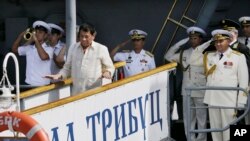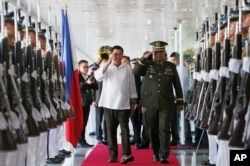Russia and the Philippines are considering joint naval exercises, a link that would advance Manila’s move toward a multi-country foreign policy and bulk up its military while giving both sides a chance to stand up to the United States.
Moscow sent a destroyer and a naval oil tanker to a port in Manila last week for a five-day goodwill visit, and the two sides are looking to expand defense cooperation, media outlets in the Philippines say. Some observers expect Russia to offer military sales, good for commerce as well as the Philippine goal of improving defense.
“As far as Duterte is concerned, he’s a big fan of Putin and he wants to build relations with Putin,” said Eduardo Araral, associate professor at the National University of Singapore’s public policy school. “He wants to buy arms from Russia. The Philippines needs to build up its military and it doesn’t want to be too dependent on the United States.”
Philippine President Rodrigo Duterte has said since taking office in June that he wants to be less dependent on former colonizer the United States and have deeper relations with China, Japan and Russia.
Duterte visited China and Japan in October, winning nods from both to help the relatively poor Southeast Asian country with aid and investment.
The arrival of two ships from Russia, which operates the world’s second most powerful military, in Manila follows Duterte’s upbeat meeting in November with Russian President Vladimir Putin at a regional summit in Peru. He told Putin then about his effort to distance his country from the United States.
Duterte has used coarse language to allege that U.S. influence extends too far into his country. Manila and Washington have observed a mutual defense treaty since 1951, worked together on resisting Muslim rebels in the Philippine south and jointly patrolled Manila’s contested claims to the South China Sea.
But Washington irritated Duterte last year with criticism of his government’s suspected extrajudicial killings in the campaign to control illegal drugs.
The Soviet Union was the chief U.S. Cold War foe, and today’s Russia often opposes U.S. involvement in the Middle East. The Philippines had little contact with Russia before Duterte’s time because of its historic U.S. alliance.
Last month the U.S. government ordered 35 Russian diplomats to leave the United States and closed two Russian compounds over what it described as “malicious” internet activities to influence the November 8 American elections.
"Russia's helping the Philippines is a shot across America's bow, as Moscow's letting us know it can operate in what has long been considered U.S.-friendly territory,” said Sean King, senior vice president with the New York political consultancy Park Strategies. “It's hard to say how far the cooperation can, or will, go but its symbolism cannot be overstated.”
Duterte’s spokesman said Thursday he saw the Russian ship visit as a chance to strengthen naval relations, Philippine media reported. The eventual signing of a Philippine-Russian memorandum of understanding could allow for military exchanges, joint exercises and student visits, the spokesman was quoted saying.
Any sales of Russian weaponry would probably lack human rights conditions, Araral said, whereas the United States may require that arms from American defense contractors not be used in the anti-drug campaign.
Stronger ties with the Philippines would help Russia sell weapons to the Asian country, Araral said. Russia has the world’s second strongest military after the United States, according to the database GlobalFirePower.com, while the Philippines ranks 51st.
The country of about 7,100 islands has no destroyers or submarines, the database says. Russia operates 15 destroyers and 60 subs.
Russia is also seen as wanting more influence elsewhere in Asia, though not enough to cause friction with regional military heavyweights such as China, Vietnam or Indonesia.
“Russia is trying to create a Eurasian arc stretching from Byelorussia to Southeast Asia,” said Fabrizio Bozzato, an associate researcher specialized in international affairs at Tamkang University in Taiwan.
“So establishing a partnership with the Philippines would be conducive or instrumental to its own Asia Pacific grand plan,” he said. “Secondly, by creating a military cooperation with the Philippines, Moscow will further decouple the Philippines from the U.S.”








